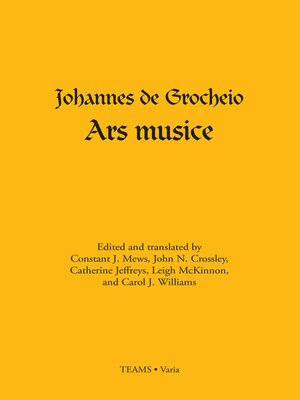
Sign up to save your library
With an OverDrive account, you can save your favorite libraries for at-a-glance information about availability. Find out more about OverDrive accounts.
Find this title in Libby, the library reading app by OverDrive.



Search for a digital library with this title
Title found at these libraries:
| Library Name | Distance |
|---|---|
| Loading... |
Ars musice, composed in Paris during the late thirteenth century, reflects Johannes de Grocheio's awareness of the complexity of the task of describing music. As the editors note in their introduction, "Grocheio is aware of the enormous range of types of music performed in different ways in different places. How can he impose order on this enormous subject matter? He decided to resolve this question by structuring his discussion around the practice of music that he observed in the city of Paris, organized into three main 'branches': music of the people (musica vulgalis), composite or regular, 'which they call measured music' (musica mensurata), and ecclesiastical music (musica ecclesiastica), which he claims derives from the other two (AM 6.2). The originality of Grocheio's treatise has attracted considerable scholarly interest. It has long been recognized as a unique source of information about musical life in medieval Paris. Through his treatise, Grocheio enables a modern reader to become aware of the complex auditory environment of that city in the late thirteenth century as well as of its intellectual vitality at a particularly vibrant moment in its history."







